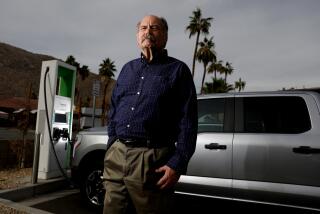Edison Defends Tax Payment to Parent
SACRAMENTO — In a document prepared for filing today with a legislative committee investigating the state power crisis, Southern California Edison contends that it was acting in “strict compliance” with the law when it sent nearly $2 billion in tax payments to its parent company for the years 1996-2000.
Under questioning from Assembly energy oversight committee members on Friday, Edison International Chairman John Bryson acknowledged that most of the money, $1.4 billion, was never paid out for taxes by the parent company but instead was used to fund expansion and development in other arms of the company.
The money has become an issue in recent months as Edison’s Southern California utility arm claims that it is on the brink of bankruptcy and unable to pay its debts. Edison International argues that the assets of the parent company and other profitable subsidiaries should not be used to rescue the struggling utility arm.
“Simply put,” Edison Senior Vice President Tom Higgins said Sunday, “you can’t use the assets of the investors to subsidize consumption of electricity. It is wrong as a matter of law and as a matter of equity.”
In the filing, Southern California Edison contends that under California Public Utility Corp. regulations it had no choice but to send its full tax obligation off to Edison International. PUC rules, the filing states, require Southern California Edison to calculate its tax liability on a “stand-alone” basis although the family of Edison companies file a consolidated tax return.
“Southern California Edison fully and scrupulously followed tax law and would have been in clear violation of California Public Utility Corp. rules had it calculated its tax payments to Edison International in any other way,” the document, released by company officials Sunday, states.
But the chairman of the Assembly energy oversight committee said Sunday that the question of legality was never an issue with the lawmakers.
“In raising the issue of taxes,” said Darrell Steinberg (D-Sacramento), “there was never a question of lawfulness. The fact remains that the utility benefited the parent company and now, in a time of crisis, I think it is more than reasonable to raise the question of the parent company helping the utility.”
Higgins said the company strongly objects to characterization of the $1.4 billion as “overpayment.”
The underlying principle, Higgins said, is similar to that of spouses filing a joint tax return. The tax benefits of one spouse are enjoyed by the other. In his testimony on Friday, Bryson estimated that Edison International’s estimated tax year 2000 refund of $500 million will be returned to the Southern California utility.
For the years 1996-2000, when Southern California Edison made $1.98 billion in tax payments to its parent, the document claims, the companies realized substantial tax savings from more than $1.1 billion Edison International invested in “350 projects that provide affordable housing to more than 28,000 low-income families.”
More to Read
Inside the business of entertainment
The Wide Shot brings you news, analysis and insights on everything from streaming wars to production — and what it all means for the future.
You may occasionally receive promotional content from the Los Angeles Times.










